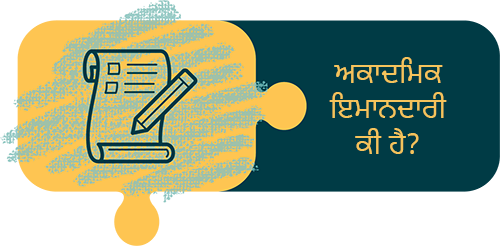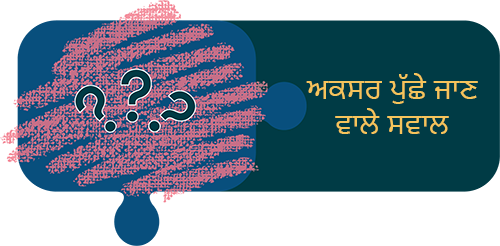ਇੱਥੇ ਅਕਾਦਮਿਕ ਇਮਾਨਦਾਰੀ ਬਾਰੇ ਕੁੱਝ ਆਮ ਸਵਾਲ ਹਨ। ਉਨ੍ਹਾਂ ਦੇ ਜਵਾਬ ਆਮ ਜਾਣਕਾਰੀ ਪ੍ਰਦਾਨ ਕਰਦੇ ਹਨ, ਅਤੇ TEQSA ਵਿਦਿਆਰਥੀਆਂ ਨੂੰ ਉਹਨਾਂ ਅਤੇ ਉਹਨਾਂ ਦੇ ਹਾਲਾਤਾਂ ਨਾਲ ਸੰਬੰਧਿਤ ਵਧੇਰੇ ਜਾਣਕਾਰੀ ਲਈ ਉਹਨਾਂ ਦੀ ਸੰਸਥਾ ਨਾਲ ਗੱਲ ਕਰਨ ਲਈ ਉਤਸ਼ਾਹਿਤ ਕਰਦਾ ਹੈ।
ਜੇ ਮੈਂ ਧੋਖਾਧੜੀ ਕਰਾਂਗਾ ਤਾਂ ਕੀ ਮੈਂ ਫੜਿਆ ਜਾਵਾਂਗਾ?
ਜੋ ਕੁੱਝ ਤੁਸੀਂ ਸੁਣਿਆ ਹੋਵੇਗਾ, ਉਸ ਦੇ ਬਾਵਜੂਦ, ਖੋਜ ਅਤੇ ਤਜਰਬਾ ਦਰਸਾਉਂਦਾ ਹੈ ਕਿ ਆਸਟ੍ਰੇਲੀਆਈ ਉੱਚ ਸਿੱਖਿਆ ਪ੍ਰਦਾਤਾ ਗੈਰ-ਕਾਨੂੰਨੀ ਵਪਾਰਕ ਧੋਖਾਧੜੀ ਸੇਵਾਵਾਂ ਦੀ ਵਰਤੋਂ ਕਰਨ ਸਮੇਤ, ਚੋਰੀ ਅਤੇ ਧੋਖਾਧੜੀ ਕਰਨ ਵਾਲੇ ਵਿਦਿਆਰਥੀਆਂ ਨੂੰ ਫੜ ਰਹੇ ਹਨ। ਨਵੀਂ ਤਕਨੀਕ, ਮੁਲਾਂਕਣ (assessment) ਕਰਨ ਦੇ ਤਰੀਕੇ ਵਿੱਚ ਤਬਦੀਲੀਆਂ ਅਤੇ ਸ਼ੱਕੀ ਲੇਖਾਂ, ਪ੍ਰੋਜੈਕਟਾਂ ਜਾਂ ਪ੍ਰੀਖਿਆਵਾਂ ਦੀ ਸਰਗਰਮੀ ਨਾਲ ਖੋਜ ਕਰਨ ਲਈ ਸਿਖਲਾਈ ਪ੍ਰਾਪਤ ਸਿੱਖਿਆ ਅਕਾਦਮਿਕ ਮਾਹਰਾਂ ਦਾ ਮਤਲਬ ਹੈ ਕਿ ਤੁਹਾਡੇ ਫੜੇ ਜਾਣ ਦੀ ਸੰਭਾਵਨਾ ਪਹਿਲਾਂ ਨਾਲੋਂ ਜ਼ਿਆਦਾ ਹੈ।
ਮੈਂ ਆਪਣੇ ਮੁਲਾਂਕਣ ਵਿੱਚ ਸਮੱਸਿਆਵਾਂ ਦਾ ਸਾਹਮਣਾ ਕਰ ਰਿਹਾ/ਰਹੀ ਹਾਂ। ਮੈਨੂੰ ਮਦਦ ਕਿਵੇਂ ਮਿਲ ਸਕਦੀ ਹੈ?
ਜੇਕਰ ਤੁਸੀਂ ਆਪਣੀ ਪੜ੍ਹਾਈ ਵਿੱਚ ਮੁਸ਼ਕਲਾਂ ਦਾ ਸਾਹਮਣਾ ਕਰ ਰਹੇ ਹੋ, ਤਾਂ ਤੁਹਾਨੂੰ ਜਿੰਨੀ ਜਲਦੀ ਹੋ ਸਕੇ ਆਪਣੇ ਯੂਨਿਟ ਕੋਆਰਡੀਨੇਟਰ ਜਾਂ ਲੈਕਚਰਾਰ ਨਾਲ ਗੱਲ ਕਰਨੀ ਚਾਹੀਦੀ ਹੈ। ਤੁਸੀਂ ਗੱਲਬਾਤ ਕਰਕੇ ਸਹਿਮਤੀ ਨਾਲ ਕੋਈ ਅਜਿਹਾ ਹੱਲ ਕੱਢ ਸਕਦੇ ਹੋ ਜੋ ਤੁਹਾਡੀ ਪੜ੍ਹਾਈ ਨੂੰ ਪੂਰਾ ਕਰਨ ਵਿੱਚ ਤੁਹਾਡੀ ਵਧੇਰੇ ਵਧੀਆ ਮਦਦ ਕਰਦਾ ਹੋਵੇ। ਤੁਹਾਨੂੰ ਆਪਣੇ ਪ੍ਰਦਾਤਾ ਨਾਲ ਕਿਸੇ ਵੀ ਪੜ੍ਹਾਈ ਕਰਨ ਦੀਆਂ ਮੁਹਾਰਤਾਂ ਵਿੱਚ ਸਹਾਇਤਾ ਬਾਰੇ ਵੀ ਗੱਲ ਕਰਨੀ ਚਾਹੀਦੀ ਹੈ ਜੋ ਉਹ ਪੇਸ਼ ਕਰਦੇ ਹਨ, ਜਿਵੇਂ ਕਿ ਹਵਾਲਾ ਦੇਣਾ, ਲੇਖ ਲਿਖਣ ਅਤੇ ਖੋਜ ਬਾਰੇ ਸਲਾਹ। ਇਹ ਕਦਮ ਚੁੱਕਣਾ ਇਹ ਦਰਸਾਉਂਦਾ ਹੈ ਕਿ ਤੁਸੀਂ ਆਪਣੀ ਅਤੇ ਆਪਣੇ ਸਕੂਲ ਜਾਂ ਯੂਨੀਵਰਸਿਟੀ ਦੀ ਅਕਾਦਮਿਕ ਇਮਾਨਦਾਰੀ ਦੀ ਕਦਰ ਕਰਦੇ ਹੋ।
ਮੈਂ ਕੁਝ ਪੜ੍ਹਾਈ ਨੋਟਸ ਪੜ੍ਹਨਾ ਚਾਹੁੰਦਾ/ਚਾਹੁੰਦੀ ਸੀ ਜੋ ਮੈਨੂੰ ਇੱਕ ਵੈੱਬਸਾਈਟ 'ਤੇ ਮਿਲੇ ਸਨ। ਇਸ ਤੋਂ ਪਹਿਲਾਂ ਕਿ ਮੈਂ ਨੋਟਸ ਤੱਕ ਪਹੁੰਚ ਸਕਾਂ, ਵੈੱਬਸਾਈਟ ਨੇ ਮੈਨੂੰ ਇੱਕ ਪੁਰਾਣੀ ਅਸਾਈਨਮੈਂਟ ਅੱਪਲੋਡ ਕਰਨ ਦੀ ਲੋੜ ਦੱਸੀ। ਕੀ ਮੈਂ ਆਪਣੀ ਪੁਰਾਣੀ ਅਸਾਈਨਮੈਂਟ ਅੱਪਲੋਡ ਕਰਕੇ ਅਕਾਦਮਿਕ ਇਮਾਨਦਾਰੀ ਦੀ ਉਲੰਘਣਾ ਕੀਤੀ ਹੈ?
ਹਾਂ, ਤੁਸੀਂ ਸੰਭਾਵੀ ਤੌਰ 'ਤੇ ਆਪਣੀ ਅਸਾਈਨਮੈਂਟ ਨੂੰ ਸਾਂਝਾ ਕਰਕੇ ਆਪਣੀ ਅਕਾਦਮਿਕ ਇਮਾਨਦਾਰੀ ਦੀ ਉਲੰਘਣਾ ਕੀਤੀ ਹੈ। ਗੈਰ-ਕਾਨੂੰਨੀ ਧੋਖਾਧੜੀ ਸੇਵਾਵਾਂ ਅਕਸਰ ਵਿਦਿਆਰਥੀਆਂ ਨੂੰ ਨੋਟ, ਲੇਖਾਂ ਜਾਂ 'ਪੜ੍ਹਾਈ ਵਿੱਚ ਸਹਾਇਤਾ' ਤੱਕ ਪਹੁੰਚ ਕਰਨ ਲਈ ਆਪਣਾ ਕੰਮ ਅੱਪਲੋਡ ਕਰਨ ਲਈ ਕਹਿੰਦੀਆਂ ਹਨ ਅਤੇ ਫਿਰ ਇਸਨੂੰ ਮੁਨਾਫ਼ੇ ਲਈ ਦੂਜੇ ਵਿਦਿਆਰਥੀਆਂ ਨੂੰ ਵੇਚਦੀਆਂ ਹਨ। ਜੇਕਰ ਤੁਹਾਡੇ ਪ੍ਰਦਾਤਾ ਨੂੰ ਪਤਾ ਲੱਗ ਜਾਂਦਾ ਹੈ, ਤਾਂ ਤੁਹਾਨੂੰ ਇਕਰਾਰਨਾਮੇ ਦੀ ਧੋਖਾਧੜੀ ਵਿੱਚ ਸ਼ਾਮਲ ਹੋਣ ਕਰਕੇ ਜੁਰਮਾਨੇ ਦਾ ਸਾਹਮਣਾ ਕਰਨਾ ਪੈ ਸਕਦਾ ਹੈ। ਤੁਹਾਨੂੰ ਆਪਣੇ ਕੰਮ ਦੀ ਸੁਰੱਖਿਆ ਕਰਨੀ ਚਾਹੀਦੀ ਹੈ ਅਤੇ ਇਸਨੂੰ ਕਦੇ ਵੀ ਕਿਸੇ ਹੋਰ ਨਾਲ ਸਾਂਝਾ ਨਹੀਂ ਕਰਨਾ ਚਾਹੀਦਾ ਜਾਂ ਇਸਨੂੰ ਤੀਜੀ-ਧਿਰ ਦੀਆਂ ਵੈੱਬਸਾਈਟਾਂ 'ਤੇ ਅੱਪਲੋਡ ਨਹੀਂ ਕਰਨਾ ਚਾਹੀਦਾ ਹੈ।
ਜੇਕਰ ਮੈਂ ਕਿਸੇ ਅਸਾਈਨਮੈਂਟ ਨੂੰ ਆਪਣੇ ਦੋਸਤਾ ਨਾਲ ਸਾਂਝਾ ਕਰਦਾ/ਕਰਦੀ ਹਾਂ ਜਿਸ ਲਈ ਮੈਨੂੰ ਪਹਿਲਾਂ ਹੀ ਗ੍ਰੇਡ ਦੇ ਦਿੱਤਾ ਗਿਆ ਹੈ, ਤਾਂ ਕੀ ਇਹ ਠੀਕ ਹੈ?
ਨਹੀਂ, ਆਪਣੀ ਅਸਾਈਨਮੈਂਟ ਨੂੰ ਆਪਣੇ ਦੋਸਤ ਨਾਲ ਸਾਂਝਾ ਕਰਨਾ ਮਿਲੀਭੁਗਤ ਦਾ ਹੀ ਇੱਕ ਰੂਪ ਮੰਨਿਆ ਜਾ ਸਕਦਾ ਹੈ, ਜੋ ਤੁਹਾਡੀ ਅਕਾਦਮਿਕ ਇਮਾਨਦਾਰੀ ਦੀ ਉਲੰਘਣਾ ਹੈ। ਇਹ ਵੀ ਖ਼ਤਰਾ ਹੈ ਕਿ ਤੁਹਾਡਾ ਦੋਸਤ ਤੁਹਾਡੇ ਕੰਮ ਨੂੰ ਦੂਜੇ ਵਿਦਿਆਰਥੀਆਂ ਨਾਲ ਸਾਂਝਾ ਕਰ ਸਕਦਾ ਹੈ ਜਾਂ ਇਸਨੂੰ ਕਿਸੇ ਗੈਰ-ਕਾਨੂੰਨੀ ਧੋਖਾਧੜੀ ਸੇਵਾ 'ਤੇ ਅੱਪਲੋਡ ਵੀ ਕਰ ਸਕਦਾ ਹੈ। ਤੁਹਾਨੂੰ ਆਪਣੇ ਕੰਮ ਦੀ ਸੁਰੱਖਿਆ ਕਰਨੀ ਚਾਹੀਦੀ ਹੈ ਅਤੇ ਇਸਨੂੰ ਕਦੇ ਵੀ ਕਿਸੇ ਹੋਰ ਨਾਲ ਸਾਂਝਾ ਨਹੀਂ ਕਰਨਾ ਚਾਹੀਦਾ ਜਾਂ ਇਸਨੂੰ ਤੀਜੀ-ਧਿਰ ਦੀਆਂ ਵੈੱਬਸਾਈਟਾਂ 'ਤੇ ਅੱਪਲੋਡ ਨਹੀਂ ਕਰਨਾ ਚਾਹੀਦਾ ਹੈ।
ਕਿਸੇ ਪਰਿਵਾਰਕ ਮੈਂਬਰ ਜਾਂ ਦੋਸਤ ਨੇ ਮੇਰੇ ਲੇਖ ਵਿੱਚ ਮਦਦ ਕਰਨ ਦੀ ਪੇਸ਼ਕਸ਼ ਕੀਤੀ ਹੈ। ਕੀ ਇਹ ਠੀਕ ਹੈ?
ਹਾਲਾਂਕਿ ਇਹ ਚੰਗਾ ਹੈ ਕਿ ਪਰਿਵਾਰ ਦਾ ਕੋਈ ਮੈਂਬਰ ਜਾਂ ਦੋਸਤ ਮਦਦ ਕਰਨ ਲਈ ਤਿਆਰ ਹੈ, ਪਰ ਤੁਹਾਨੂੰ ਸਾਵਧਾਨ ਰਹਿਣ ਦੀ ਲੋੜ ਹੈ। ਗ੍ਰੈਮਰ (ਵਿਆਕਰਨ) ਅਤੇ ਸਪੈਲਿੰਗ (ਸ਼ਬਦਜੋੜ) ਦੀ ਇੱਕ ਜਲਦ ਜਾਂਚ ਠੀਕ ਹੈ, ਪਰ ਜੇਕਰ ਤੁਹਾਡਾ ਪਰਿਵਾਰਕ ਮੈਂਬਰ ਜਾਂ ਦੋਸਤ ਤੁਹਾਡੀ ਅਸਾਈਨਮੈਂਟ ਦੀ ਸਮੱਗਰੀ ਵਿੱਚ ਯੋਗਦਾਨ ਪਾਉਂਦਾ ਹੈ, ਜਾਂ ਉਸਨੂੰ ਬਦਲਦਾ ਹੈ ਤਾਂ ਇਹ ਅਕਾਦਮਿਕ ਇਮਾਨਦਾਰੀ ਦੀ ਉਲੰਘਣਾ ਹੋ ਸਕਦੀ ਹੈ।
ਇਹ ਨੋਟ ਕੀਤਾ ਜਾਣਾ ਚਾਹੀਦਾ ਹੈ, ਆਸਟ੍ਰੇਲੀਆਈ ਕਾਨੂੰਨਾਂ ਦੇ ਤਹਿਤ, ਕੋਈ ਵੀ ਵਿਅਕਤੀ ਜੋ ਗੈਰ-ਕਾਨੂੰਨੀ ਧੋਖਾਧੜੀ ਸੇਵਾਵਾਂ ਪ੍ਰਦਾਨ ਕਰਦਾ ਹੈ (ਜਿਵੇਂ ਕਿ ਲੇਖ ਲਿਖਣਾ ਜਾਂ ਕਿਸੇ ਲਈ ਇਮਤਿਹਾਨ ਲਿਖਣਾ) ਪਰ ਭੁਗਤਾਨ ਪ੍ਰਾਪਤ ਨਹੀਂ ਕਰਦਾ ਹੈ ਤਾਂ ਵੀ ਉਸਨੂੰ ਭਾਰੀ ਜੁਰਮਾਨਾ ਲੱਗ ਸਕਦਾ ਹੈ।
ਮੇਰੇ ਪ੍ਰਦਾਤਾ ਨੇ ਦੋਸ਼ ਲਗਾਇਆ ਹੈ ਕਿ ਮੈਂ ਅਕਾਦਮਿਕ ਹੇਰਾਫ਼ੇਰੀ ਕੀਤੀ ਹੈ। ਮੈਨੂੰ ਕੀ ਕਰਨਾ ਚਾਹੀਦਾ ਹੈ?
ਜੇਕਰ ਤੁਹਾਡੇ 'ਤੇ ਅਕਾਦਮਿਕ ਇਮਾਨਦਾਰੀ ਦੀ ਉਲੰਘਣਾ ਕਰਨ ਦਾ ਦੋਸ਼ ਲੱਗਿਆ ਹੈ, ਤਾਂ ਤੁਹਾਨੂੰ ਇਸ ਮਾਮਲੇ ਨੂੰ ਗੰਭੀਰਤਾ ਨਾਲ ਲੈਣਾ ਚਾਹੀਦਾ ਹੈ। ਤੁਹਾਡੀ ਸੰਸਥਾ ਕੋਲ ਵਿਦਿਆਰਥੀ ਅਨੁਸ਼ਾਸਨ, ਸ਼ਿਕਾਇਤਾਂ ਅਤੇ ਅਪੀਲਾਂ ਨਾਲ ਸੰਬੰਧਿਤ ਸਪੱਸ਼ਟ ਨੀਤੀਆਂ ਅਤੇ ਪ੍ਰਕਿਰਿਆਵਾਂ ਹੋਣੀਆਂ ਚਾਹੀਦੀਆਂ ਹਨ। ਤੁਹਾਨੂੰ ਇਹਨਾਂ ਨੀਤੀਆਂ ਨੂੰ ਪੜ੍ਹਨਾ ਚਾਹੀਦਾ ਹੈ ਅਤੇ ਤੁਹਾਡੀ ਸੰਸਥਾ 'ਤੇ ਨਿਰਭਰ ਕਰਦੇ ਹੋਏ, ਤੁਸੀਂ ਕਿਸੇ ਵਿਦਿਆਰਥੀ ਐਸੋਸੀਏਸ਼ਨ ਦੁਆਰਾ ਪੇਸ਼ ਕੀਤੀ ਜਾਣ ਵਾਲੀਆਂ ਵਕਾਲਤ ਅਤੇ ਸਹਾਇਤਾ ਸੇਵਾਵਾਂ ਲੈਣ ਦੇ ਯੋਗ ਵੀ ਹੋ ਸਕਦੇ ਹੋ।
ਮੈਂ ਜਾਣਦਾ/ਜਾਣਦੀ ਹਾਂ ਕਿ ਮੇਰੇ ਕੋਰਸ ਵਿੱਚ ਲੋਕ ਧੋਖਾਧੜੀ ਕਰ ਰਹੇ ਹਨ। ਮੈਨੂੰ ਆਪਣੀਆਂ ਚਿੰਤਾਵਾਂ ਦੀ ਰਿਪੋਰਟ ਕਿਸ ਨੂੰ ਕਰਨੀ ਚਾਹੀਦੀ ਹੈ?
ਜੇਕਰ ਤੁਹਾਡੇ ਕੋਲ ਸਬੂਤ ਹਨ ਕਿ ਤੁਹਾਡੇ ਕੋਰਸ ਵਿਚਲੇ ਲੋਕ ਧੋਖਾਧੜੀ ਕਰ ਰਹੇ ਹਨ, ਤਾਂ ਤੁਹਾਨੂੰ ਆਪਣੇ ਸਕੂਲ ਜਾਂ ਯੂਨੀਵਰਸਿਟੀ ਨੂੰ ਸੂਚਿਤ ਕਰਨਾ ਚਾਹੀਦਾ ਹੈ। ਹਾਲਾਤ 'ਤੇ ਨਿਰਭਰ ਕਰਦਿਆਂ, ਤੁਸੀਂ ਪਹਿਲਾਂ ਆਪਣੇ ਯੂਨਿਟ ਕੋਆਰਡੀਨੇਟਰ ਜਾਂ ਲੈਕਚਰਾਰ ਕੋਲ ਆਪਣੀਆਂ ਚਿੰਤਾਵਾਂ ਨੂੰ ਉਠਾਉਣਾ ਚਾਹ ਸਕਦੇ ਹੋ ਜਾਂ ਤੁਸੀਂ ਹੋਰ ਰਸਮੀ ਚੈਨਲਾਂ ਰਾਹੀਂ ਸ਼ਿਕਾਇਤ ਕਰਨਾ ਚਾਹ ਸਕਦੇ ਹੋ। ਤੁਹਾਡੀ ਸੰਸਥਾ ਦੀ ਸਿਖਲਾਈ ਪ੍ਰਬੰਧਨ ਪ੍ਰਣਾਲੀ (LMS), ਵਿਦਿਆਰਥੀ ਹੈਂਡਬੁੱਕ ਜਾਂ ਵੈੱਬਸਾਈਟ ਇਹ ਜਾਣਕਾਰੀ ਲੱਭਣ ਲਈ ਇੱਕ ਚੰਗੀ ਥਾਂ ਹੈ।
ਕੀ ਧੋਖਾਧੜੀ ਮੇਰੇ ਭਵਿੱਖ ਦੇ ਪੇਸ਼ੇ (ਕੈਰੀਅਰ) ਨੂੰ ਪ੍ਰਭਾਵਿਤ ਕਰ ਸਕਦੀ ਹੈ?
ਹਾਂ, ਕਿਸੇ ਵੀ ਕਿਸਮ ਦੀ ਧੋਖਾਧੜੀ ਦਾ ਤੁਹਾਡੇ ਭਵਿੱਖ ਦੇ ਕੈਰੀਅਰ 'ਤੇ ਵੱਡਾ ਅਤੇ ਨਕਾਰਾਤਮਕ ਪ੍ਰਭਾਵ ਪੈ ਸਕਦਾ ਹੈ। ਬਹੁਤ ਸਾਰੇ ਵਿਦਿਆਰਥੀ ਆਪਣੇ ਕੈਰੀਅਰ ਦੇ ਟੀਚਿਆਂ ਨੂੰ ਪ੍ਰਾਪਤ ਕਰਨ ਲਈ ਲੋੜੀਂਦੀ ਜਾਣਕਾਰੀ ਅਤੇ ਹੁਨਰ ਸਿੱਖਣ ਲਈ ਪੜ੍ਹ ਰਹੇ ਹਨ। ਭਾਵੇਂ ਤੁਸੀਂ ਫੜੇ ਨਹੀਂ ਜਾਂਦੇ, ਪਰ ਲੋੜੀਂਦਾ ਕੰਮ ਖੁਦ ਨਾ ਕਰਨ ਨਾਲ, ਹੋ ਸਕਦਾ ਹੈ ਤੁਸੀਂ ਆਪਣੇ ਭਵਿੱਖ ਦੇ ਰੁਜ਼ਗਾਰਦਾਤਾ ਦੁਆਰਾ ਉਮੀਦ ਕੀਤੇ ਮਾਪਦੰਡਾਂ ਨੂੰ ਪੂਰਾ ਨਾ ਕਰ ਸਕੋ। ਅਤੇ ਜੇਕਰ ਤੁਸੀਂ ਧੋਖਾਧੜੀ ਕਰਦੇ ਫੜੇ ਜਾਂਦੇ ਹੋ, ਤਾਂ ਤੁਹਾਨੂੰ ਕਿਸੇ ਪੇਸ਼ੇਵਰ ਸੰਸਥਾ ਦੁਆਰਾ ਰਜਿਸਟ੍ਰੇਸ਼ਨ ਤੋਂ ਇਨਕਾਰ ਕੀਤਾ ਜਾ ਸਕਦਾ ਹੈ। ਤੁਸੀਂ ਗੈਰ-ਕਾਨੂੰਨੀ ਧੋਖਾਧੜੀ ਸੇਵਾ ਦੁਆਰਾ ਬਲੈਕਮੇਲ ਕੀਤੇ ਜਾਣ ਦੇ ਜ਼ੋਖਮ ਵਿੱਚ ਵੀ ਆਉਂਦੇ ਹੋ ਜੋ ਤੁਹਾਡੇ ਰੁਜ਼ਗਾਰਦਾਤਾ ਨੂੰ ਤੁਹਾਡੀ ਧੋਖਾਧੜੀ ਦਾ ਪਰਦਾਫਾਸ਼ ਕਰਨ ਦੀ ਧਮਕੀ ਦਿੰਦੀਆਂ ਹਨ, ਜਦੋਂ ਤੱਕ ਤੁਸੀਂ ਉਹਨਾਂ ਨੂੰ ਹੋਰ ਪੈਸੇ ਨਹੀਂ ਦਿੰਦੇ ਹੋ।
ਮੈਂ ਆਪਣਾ ਕੰਮ ਕਰਨ ਲਈ ਕਿਸੇ ਹੋਰ ਨੂੰ ਪੈਸੇ ਦਿੱਤੇ ਅਤੇ ਹੁਣ ਉਹ ਮੰਗ ਕਰ ਰਹੇ ਹਨ ਕਿ ਮੈਂ ਉਨ੍ਹਾਂ ਨੂੰ ਹੋਰ ਪੈਸੇ ਦੇਵਾਂ ਨਹੀਂ ਤਾਂ ਉਹ ਮੇਰੀ ਸੰਸਥਾ ਨੂੰ ਦੱਸ ਦੇਣਗੇ। ਮੈਨੂੰ ਕੀ ਕਰਨਾ ਚਾਹੀਦਾ ਹੈ?
ਕਿਸੇ ਵਿਅਕਤੀ ਨੂੰ ਨਕਾਰਾਤਮਕ ਨਤੀਜਿਆਂ ਦੀ ਧਮਕੀ ਦੇਣਾ, ਜਦੋਂ ਤੱਕ ਉਹ ਵਿਅਕਤੀ ਪੈਸੇ ਦਾ ਭੁਗਤਾਨ ਨਹੀਂ ਕਰਦਾ, ਇਸਨੂੰ ਬਲੈਕਮੇਲ ਕਰਨ ਵਜੋਂ ਜਾਣਿਆ ਜਾਂਦਾ ਹੈ। ਬਲੈਕਮੇਲ ਕਰਨਾ ਗੈਰ-ਕਾਨੂੰਨੀ ਹੈ, ਪਰ ਬਦਕਿਸਮਤੀ ਨਾਲ, ਕੁੱਝ ਵਿਦਿਆਰਥੀਆਂ ਨੂੰ ਧੋਖਾਧੜੀ ਵਿੱਚ ਸ਼ਾਮਲ ਹੋਣ ਤੋਂ ਬਾਅਦ ਗੈਰ-ਕਾਨੂੰਨੀ ਧੋਖਾਧੜੀ ਸੇਵਾਵਾਂ ਅਤੇ ਇੱਥੋਂ ਤੱਕ ਕਿ ਦੋਸਤਾਂ, ਸਾਥੀ ਵਿਦਿਆਰਥੀਆਂ ਜਾਂ ਪਰਿਵਾਰਕ ਮੈਂਬਰਾਂ ਦੁਆਰਾ ਬਲੈਕਮੇਲ ਕੀਤਾ ਜਾਂਦਾ ਹੈ। ਮੰਗਾਂ ਨੂੰ ਪੂਰਾ ਕਰਨ ਲਈ ਇੱਕ ਵਾਰ ਭੁਗਤਾਨ ਕਰਨਾ ਅਕਸਰ ਇਸਦਾ ਅੰਤ ਨਹੀਂ ਹੁੰਦਾ, ਉਹ ਹੋਰ ਅਤੇ ਫਿਰ ਹੋਰ ਪੈਸੇ ਦੀ ਮੰਗ ਕਰ ਸਕਦੇ ਹਨ। ਇਹ ਉਹਨਾਂ ਵਿਦਿਆਰਥੀਆਂ ਲਈ ਬਹੁਤ ਤਣਾਅਪੂਰਨ ਸਥਿਤੀ ਹੋ ਸਕਦੀ ਹੈ, ਜੋ ਬਲੈਕਮੇਲਰ ਦੀਆਂ ਮੰਗਾਂ ਦੇ ਨਾਲ-ਨਾਲ ਆਪਣੀ ਸੰਸਥਾ ਜਾਂ ਰੁਜ਼ਗਾਰਦਾਤਾ ਨੂੰ ਪਤਾ ਲੱਗਣ 'ਤੇ ਨਤੀਜਿਆਂ ਬਾਰੇ ਵੀ ਚਿੰਤਤ ਹੁੰਦੇ ਹਨ।
ਜੇਕਰ ਤੁਹਾਨੂੰ ਬਲੈਕਮੇਲ ਕੀਤਾ ਜਾ ਰਿਹਾ ਹੈ, ਤਾਂ ਤੁਹਾਨੂੰ ਆਪਣੀ ਸਥਿਤੀ ਬਾਰੇ ਸਲਾਹ ਲੈਣੀ ਚਾਹੀਦੀ ਹੈ। ਕੁੱਝ ਸੰਸਥਾਵਾਂ ਕੋਲ ਸੁਤੰਤਰ ਵਿਦਿਆਰਥੀ ਵਕਾਲਤ ਜਾਂ ਕਾਨੂੰਨੀ ਸੇਵਾਵਾਂ ਹਨ ਜਿੱਥੇ ਤੁਸੀਂ ਗੁਪਤ ਸਲਾਹ ਪ੍ਰਾਪਤ ਕਰ ਸਕਦੇ ਹੋ। ਸ਼ਾਇਦ ਕਮਿਊਨਿਟੀ ਲੀਗਲ ਸੈਂਟਰ ਵੀ ਤੁਹਾਨੂੰ ਸਲਾਹ ਦੇ ਸਕਦੇ ਹਨ। ਤੁਹਾਨੂੰ ਸੰਭਾਵੀ ਸਬੂਤ ਵਜੋਂ ਉਨ੍ਹਾਂ ਸਾਰੇ ਸੁਨੇਹਿਆਂ ਦੀ ਇੱਕ ਕਾਪੀ ਆਪਣੇ ਕੋਲ ਰੱਖਣੀ ਚਾਹੀਦੀ ਹੈ ਜੋ ਤੁਹਾਨੂੰ ਪ੍ਰਾਪਤ ਹੋਏ ਹਨ ਕਿ ਕੀ ਹੋਇਆ ਹੈ।
ਤੁਸੀਂ ਆਪਣੀ ਸੰਸਥਾ ਨੂੰ ਆਪਣੀ ਧੋਖਾਧੜੀ ਦੀ ਆਪਣੇ-ਆਪ ਰਿਪੋਰਟ ਕਰਨ ਦਾ ਫ਼ੈਸਲਾ ਵੀ ਕਰ ਸਕਦੇ ਹੋ। ਸਵੈ-ਰਿਪੋਰਟ ਕਰਨ ਦਾ ਇੱਕ ਵੱਡਾ ਫ਼ਾਇਦਾ ਇਹ ਹੈ ਕਿ ਜੋ ਵਿਅਕਤੀ ਤੁਹਾਨੂੰ ਰਿਪੋਰਟ ਕਰਨ ਦੀ ਧਮਕੀ ਦੇ ਰਿਹਾ ਹੈ, ਉਹ ਤੁਹਾਡੇ ਉੱਤੇ ਆਪਣੀ ਸ਼ਕਤੀ ਗੁਆ ਦੇਵੇਗਾ। ਇਸਦਾ ਇੱਕ ਹੋਰ ਫ਼ਾਇਦਾ ਗਲਤੀ ਤੋਂ ਸਿੱਖਣ ਅਤੇ ਇਹ ਜਾਣਦੇ ਹੋਏ ਆਪਣੀ ਡਿਗਰੀ ਨੂੰ ਪੂਰਾ ਕਰਨ ਦੇ ਯੋਗ ਹੋਣਾ ਹੈ ਕਿ ਤੁਸੀਂ ਇਮਾਨਦਾਰੀ ਨਾਲ ਕੰਮ ਕੀਤਾ ਹੈ। ਹਾਲਾਂਕਿ, ਤੁਹਾਨੂੰ ਤੁਹਾਡੀ ਸੰਸਥਾ ਦੁਆਰਾ ਇਸ ਦੀਆਂ ਨੀਤੀਆਂ ਅਤੇ ਪ੍ਰਕਿਰਿਆਵਾਂ ਦੇ ਅਨੁਸਾਰ ਮਾਮਲੇ ਨਾਲ ਪੇਸ਼ ਆਉਣ ਦੀ ਉਮੀਦ ਕਰਨੀ ਚਾਹੀਦੀ ਹੈ, ਜਿਸਦਾ ਮਤਲਬ ਹੈ ਕਿ ਤੁਹਾਨੂੰ ਧੋਖਾਧੜੀ ਦੀ ਪ੍ਰਕਿਰਤੀ ਦੇ ਆਧਾਰ 'ਤੇ, ਅਕਾਦਮਿਕ ਜੁਰਮਾਨੇ ਜਾਂ ਇਸਤੋਂ ਵੱਧ ਦਾ ਸਾਹਮਣਾ ਕਰਨਾ ਪੈ ਸਕਦਾ ਹੈ।
ਡੀਕਿਨ ਯੂਨੀਵਰਸਿਟੀ ਸਟੂਡੈਂਟ ਐਸੋਸੀਏਸ਼ਨ ਦੁਆਰਾ ਵਿਕਸਿਤ ਜਾਣਕਾਰੀ ਤੋਂ ਲਿਆ ਗਿਆ ਹੈ
ਅਕਾਦਮਿਕ ਇਮਾਨਦਾਰੀ ਨੂੰ ਸਮਝਣਾ’ ਲੈਂਡਿੰਗ ਪੰਨੇ 'ਤੇ ਵਾਪਸ ਜਾਓ












